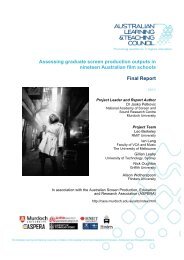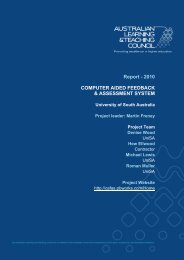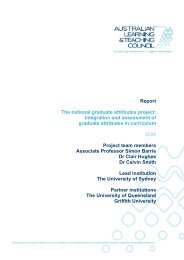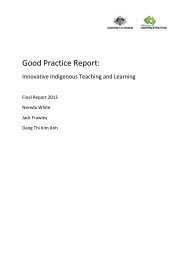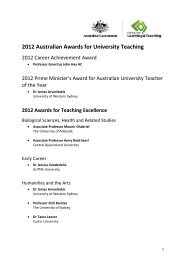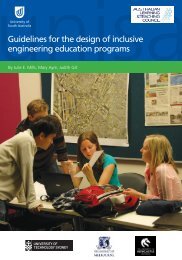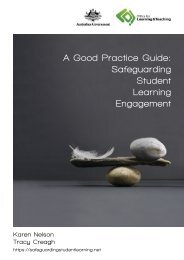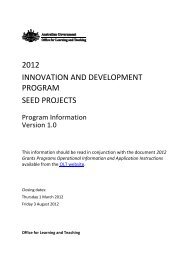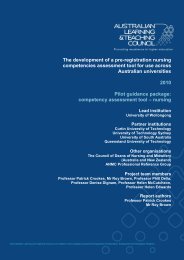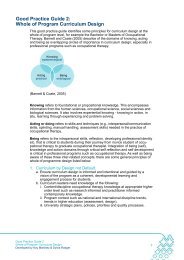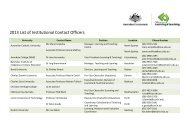national standards for psychological literacy and global citizenship
national standards for psychological literacy and global citizenship
national standards for psychological literacy and global citizenship
Create successful ePaper yourself
Turn your PDF publications into a flip-book with our unique Google optimized e-Paper software.
3.2 Progress toward achieving aims <strong>and</strong> intended outcomes<br />
During the course of this Fellowship, (a) the scholarly development of the concept of<br />
<strong>psychological</strong> <strong>literacy</strong> was progressed, (b) <strong>psychological</strong> <strong>literacy</strong> as the primary outcome of<br />
the psychology major has been promoted <strong>and</strong> accepted by others, <strong>and</strong> (c) the creation of<br />
teaching <strong>and</strong> assessment strategies <strong>for</strong> the development of <strong>psychological</strong> <strong>literacy</strong> has been<br />
encouraged. The development of pedagogy (particularly in relation to the re-examination of<br />
aims <strong>and</strong> thus outcomes) to guide curriculum renewal in UG psychology has been discussed<br />
at almost all <strong>national</strong> <strong>and</strong> inter<strong>national</strong> meetings, in particular ICOPE 2010, 2010 APEN<br />
Meetings, APS Annual conferences, the April 2012 Summit, <strong>and</strong> the UK HEA Psychology<br />
Network Retreat 2011. The discussion continues (e.g., at <strong>national</strong> committee meetings such<br />
as PIFOPS). Moreover, there is now evidence that others are taking up the notion of<br />
<strong>psychological</strong> <strong>literacy</strong> <strong>and</strong> purposefully reshaping their curriculum around this outcome.<br />
3.2.1: Scholarly development of the concept of <strong>psychological</strong> <strong>literacy</strong><br />
Evidence of outcome attainment:<br />
Positively reviewed (UK, USA) edited book (Cranney & Dunn, 2011a) on <strong>psychological</strong><br />
<strong>literacy</strong>;<br />
Contributions to that book by Bernstein <strong>and</strong> McGovern on the scientist educator <strong>and</strong> on<br />
developing <strong>psychological</strong>ly literate educators; subsequent book on the latter topic by<br />
McGovern (2012);<br />
Invited chapters <strong>for</strong> other books (e.g., Cranney et al., 2012); <strong>and</strong>,<br />
Invitations to talk on the pedagogy (e.g., invited address at the Inter<strong>national</strong> Conference<br />
on Teaching Psychology [ICTP]).<br />
Please see www.<strong>psychological</strong><strong>literacy</strong>.com <strong>for</strong> a full listing of publications relevant to<br />
<strong>psychological</strong> <strong>literacy</strong>. In summary, the second aim, to develop future-oriented pedagogy <strong>for</strong><br />
UG psychology education, based on <strong>psychological</strong> <strong>literacy</strong> as the primary outcome, has<br />
certainly progressed within the theoretical domain, however there remains the need <strong>for</strong><br />
further development in terms of practice.<br />
3.2.2 Promotion <strong>and</strong> acceptance of <strong>psychological</strong> <strong>literacy</strong> as the key outcome<br />
of UG psychology education<br />
Along with 2.2.4 above, this represents the central work of this Fellowship. It should first be<br />
noted that one way in which to conceptualise <strong>psychological</strong> <strong>literacy</strong> is in terms of GAs. Thus<br />
one might wonder why it is a separate outcome. There are two reasons. First, the creation<br />
of the intended paradigm shift in UG psychology education should be facilitated by the<br />
utilisation of some key terms about which stakeholders have a shared underst<strong>and</strong>ing.<br />
Psychological <strong>literacy</strong> is intended to be one of those terms. This is one reason why we<br />
created www.<strong>psychological</strong><strong>literacy</strong>.com: to create a <strong>global</strong> presence <strong>and</strong> common<br />
underst<strong>and</strong>ing of the term. Second, further developments of the concept include the<br />
pragmatic taxonomy (Cranney et al., in press), which takes the UG psychology student’s<br />
perspective, <strong>and</strong> includes scientific <strong>literacy</strong>, employability, <strong>and</strong> <strong>global</strong> <strong>citizenship</strong>. As<br />
indicated in 2.2.4, psychology educators may be more com<strong>for</strong>table with starting their<br />
paradigm shift with scientific <strong>literacy</strong>: such educators are now focussed on knowledge<br />
NATIONAL STANDARDS FOR PSYCHOLOGICAL LITERACY AND GLOBAL CITIZENSHIP 13



